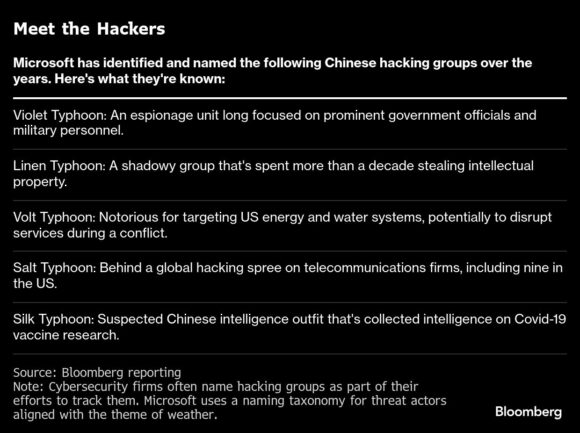The number of companies and organizations compromised by a security vulnerability in Microsoft Corp.’s SharePoint servers is increasing rapidly, with the tally of victims soaring more than six-fold in a few days, according to one research firm.
Hackers have breached about 400 government agencies, corporations and other groups, according to estimates from Eye Security, the Dutch cybersecurity company that identified an early wave of the attacks last week. That’s up from roughly 60 based on its previous estimate provided to Bloomberg News on Tuesday.
The security firm said that most of the victims are in the US, followed by Mauritius, Jordan, South Africa and the Netherlands. The National Nuclear Security Administration, the US agency responsible for maintaining and designing the nation’s cache of nuclear weapons, was among those breached, Bloomberg reported earlier.
The hacks are among the latest major breaches that Microsoft has blamed, at least in part, on China and come amid heightened tensions between Washington and Beijing over global security and trade. The US has repeatedly criticized China for campaigns that have allegedly stolen government and corporate secrets over a period spanning decades.
“We estimate that the real number might be much higher as there can be many more hidden ways to compromise servers that do not leave traces,” Eye Security’s co-owner Vaisha Bernard said in an email to Bloomberg News. “This is still developing, and other opportunistic adversaries continue to exploit vulnerable servers.”
The organizations compromised in the SharePoint breaches include many working in government, education, and technology services, Bernard said. There were smaller numbers of victims in countries across Europe, Asia, the Middle East and South America.
The security flaws allow hackers to access SharePoint servers and steal keys that can let them impersonate users or services, potentially enabling deep access into compromised networks to steal confidential data. Microsoft has issued patches to fix the vulnerabilities, but researchers cautioned that hackers may have already got a foothold into many servers.
Microsoft on Tuesday accused Chinese state-sponsored hackers known as Linen Typhoon and Violet Typhoon of being behind the attacks. Another hacking group based in China, which Microsoft calls Storm-2603, also exploited them, according to the company.

The Redmond, Washington company has repeatedly blamed China for major cyberattacks. In 2021, an alleged Chinese operation compromised tens of thousands of Microsoft Exchange servers. In 2023, another alleged Chinese attack on Microsoft Exchange compromised senior US officials’ email accounts. A US government review later accused Microsoft of a “cascade of security failures” over the 2023 incident.
Eugenio Benincasa, a researcher at ETH Zurich’s Center for Security Studies who specializes in analyzing Chinese cyberattacks, said members of the groups identified by Microsoft had previously been indicted in the US for their alleged involvement in hacking campaigns targeting US organizations. They are well known for their “extensive espionage,” he said.
It’s likely that the SharePoint breaches are being carried out by proxy groups that work with the government rather than Chinese government agencies directly carrying out the hacking, according to Benincasa. Private hacking companies in the country sometimes participate in “hacker for hire” operations, he added.
“Now that at least three groups have reportedly exploited the same vulnerability, it’s plausible more could follow,” he said.
China is against all forms of cyberattacks and cybercrime, the Chinese Embassy in Washington said in a statement on Tuesday.
“We also firmly oppose smearing others without solid evidence,” the embassy said. “We hope that relevant parties will adopt a professional and responsible attitude when characterizing cyber incidents, basing their conclusions on sufficient evidence rather than unfounded speculation and accusations.”
According to Microsoft, the hacking group Linen Typhoon was first identified in 2012, and is focused on stealing intellectual property, primarily targeting organizations related to government, defense, strategic planning, and human rights. Violet Typhoon, first observed in 2015, was “dedicated to espionage” and primarily targeted former government and military personnel, non-governmental organizations, as well as media and education sectors in the US, Europe, and East Asia.
The hackers have also used the SharePoint flaws to break into systems belonging to the US Education Department, Florida’s Department of Revenue and the Rhode Island General Assembly, Bloomberg previously reported.
Photo: Pedestrians pass a Microsoft store in New York. Photographer: Adam Gray/Bloomberg
Topics Cyber
Was this article valuable?
Here are more articles you may enjoy.



 US Supreme Court Rejects Trump’s Global Tariffs
US Supreme Court Rejects Trump’s Global Tariffs  Insurify Starts App With ChatGPT to Allow Consumers to Shop for Insurance
Insurify Starts App With ChatGPT to Allow Consumers to Shop for Insurance  AI Claim Assistant Now Taking Auto Damage Claims Calls at Travelers
AI Claim Assistant Now Taking Auto Damage Claims Calls at Travelers  Fla. Commissioner Offers Major Changes to Citizens’ Commercial Clearinghouse Plan
Fla. Commissioner Offers Major Changes to Citizens’ Commercial Clearinghouse Plan 

